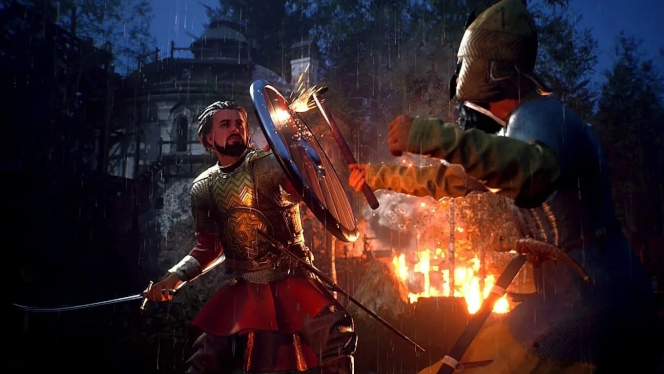Open-world games offer vast landscapes brimming with possibilities. But what separates a sprawling masterpiece from a tedious slog? Often, it boils down to the developer’s vision, execution, and most importantly, respect for the player’s time. Today, we’ll delve into SMUTA, a recent title set against the backdrop of Russia’s “Time of Troubles,” a period of political and social upheaval. Does SMUTA capture the essence of this tumultuous era, or does it crumble under the weight of uninspired design?
A Familiar Framework, Flawed Foundation
Open-world veterans will find a sense of deja vu in SMUTA’s core structure. Quests, exploration, and combat form the pillars of gameplay. However, beneath this familiar framework lies a foundation riddled with cracks. The developers seem to have prioritized quantity over quality, resulting in an endlessly sprawling world devoid of compelling activities or meaningful player interaction.

The core problem lies in the development process itself. While budget is undeniably important, experience reigns supreme. Here’s where SMUTA falters. The design choices smack of a team lacking the experience to breathe life into a vast open world. The result? A game that feels more like a presentation – a checklist of features rather than a cohesive, engaging experience.
A slog through Boredom: Quests, Combat, and Character
SMUTA’s quests epitomize its uninspired design. IRI, the studio behind the game, reportedly demanded 40 hours of gameplay, a metric devoid of meaning without compelling narrative or engaging mechanics. The solution? An overabundance of tedious dialogue sequences that drag on endlessly, failing to capture the player’s interest.
Combat, another crucial aspect of the open-world experience, fares no better in SMUTA. The system feels clunky and unresponsive. Animations are sluggish, and enemy AI seems oblivious to the player’s presence at times. The main character’s animations are particularly jarring, with exaggerated flinching under attack and sluggish recovery times. This disconnect between player input and character response shatters immersion and makes combat a chore.
Further detracting from the experience is the protagonist himself. Deprived of any real personality or depth, he becomes a mere vessel for the player to navigate the bland world. This lack of character development makes it difficult to invest in the story or the protagonist’s journey.
A Missed Opportunity: SMUTA Fails to Captivate
The “Time of Troubles” presents a rich historical tapestry ripe for exploration in a video game. SMUTA, however, fails to capitalize on this potential. The vast open world feels empty, the story fails to engage, and the gameplay mechanics are frustratingly basic. While the core framework of an open-world game is present, it’s devoid of the spark that ignites player immersion and compels them to keep exploring.
FAQs
Q: Is SMUTA a good game?
A: SMUTA fails to deliver an engaging open-world experience. Repetitive quests, clunky combat, and a bland world make it a chore to play.
Q: What’s wrong with SMUTA’s quests?
A: The game prioritizes quantity over quality, with an overabundance of tedious dialogue sequences that fail to capture the player’s interest.
Q: How is the combat in SMUTA?
A: Combat feels unresponsive and clunky. Enemy AI is poor, and the character’s animations are jarring.
Q: Is SMUTA worth playing?
A: Unless you’re a die-hard history buff specifically interested in the “Time of Troubles,” SMUTA offers little to redeem itself. There are far better open-world experiences available.




